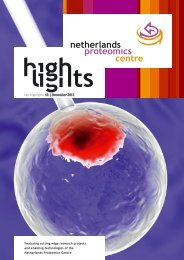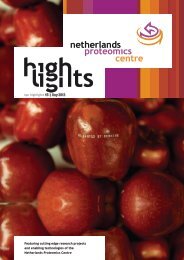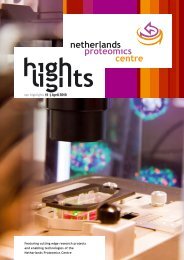NPC Valorisation Voucher - Netherlands Proteomics Centre
NPC Valorisation Voucher - Netherlands Proteomics Centre
NPC Valorisation Voucher - Netherlands Proteomics Centre
Create successful ePaper yourself
Turn your PDF publications into a flip-book with our unique Google optimized e-Paper software.
<strong>NPC</strong> Supervisory BoardThe <strong>NPC</strong> Supervisory Board represents the highest ‘levelof control’. The board advises the Executive Board onall matters related to the overall strategy and has toapprove its main decisions. The Supervisory Board hasfinal responsibility for all <strong>NPC</strong> activities. The SupervisoryBoard meets twice a year, with additional meetings ifnecessary. Marcel Wubbolts (DSM) and René Medema(<strong>Netherlands</strong> Cancer Institute) both joined the <strong>NPC</strong>Supervisory Board last year. They explain the importanceof proteomics in current life sciences research.<strong>Proteomics</strong> in the development of sustainable production“Sustainability is a leading principle in managing our projects,”says Marcel Wubbolts, Chief Technology Officer (CTO) atDSM and member of the <strong>NPC</strong> Supervisory Board. Wubbolts isresponsible for overall technology for DSM and that includesthe development of sustainable production methods forpharma, nutritional and materials applications. Wubboltsexplains: “Our products include biobased materials for cars,biofuels from non-food feedstock and enzymes for medicineproduction. Sustainable production lowers energy and materialuse enormously. For example, initially the production ofCephalexin, a semi-synthetic cephalosporin, from Penicillin Grequired thirteen steps. We can now do it in three steps: firstfermentation using a fungus in which engineered genes wereintroduced, followed by two enzymatic steps, all in water. Theuse of material and energy was reduced by 65 percent.”Wubbolts stresses that proteomics techniques are essentialfor diverse applications such as quality control of productionstrains and enzymes. “When you introduce new genesinto a fungus to improve a production process, you need toknow if the enzymes reachthe proper location withinthe fungus and whetherthey perform the way theyshould. That the fungusmakes the desired productalso needs to be proved. Sowe use techniques like massspectrometry, NMR, 2-D gelelectrophoresis and crystallography.”Marcel WubboltsCollaboration with universities and institutes such as <strong>NPC</strong>plays an important role in the product development of DSM.“The initial phase of trying a new technology is often riskyand costly. Working in consortiums divides the risks and costs.When we ascertain that a technique is strategically importantvia such a partnership, we also build it up in house. Wehave learned a great deal from universities this way and willcontinue to do so.”| 31<strong>Proteomics</strong> in oncobiology“<strong>Proteomics</strong> plays a very important role in oncology,” affirmsProf. René Medema, chairman of the Board of the <strong>Netherlands</strong>Cancer Institute (NKI-AVL) and member of the <strong>NPC</strong> SupervisoryBoard. “Advances in both genomics and proteomics will enablethe transition to personalised medicine. Thanks to these omicstechnologies, the diversity amongst tumours can be discerned.<strong>Proteomics</strong> enables us to discover biomarkers with which onecan follow tumours, for example to detect whether theyrespond to a certain therapy or not. <strong>Proteomics</strong> is indispensableas a tool to unravel the fundamentals of oncobiology.”Medema, who is also member of the <strong>NPC</strong> Supervisory board,is very glad to have access to new proteomics techniquesthrough the <strong>NPC</strong>. “As a hospital one could decide to developall the proteomics techniques in-house, but this would requireenormous investments in people and equipment. However, asa user of the technologies you do want to have access to thelatest innovations, so we arevery glad that the <strong>NPC</strong> connectsus to research groups that wantto bring these technologies toan even higher level.”Medema stresses that theright infrastructure has provenvital to the innovative cancerresearch with which the NKIhas built its internationalreputation. The improvementRené Medemaof cancer therapies and effectiveuse of available medication have also profited from thisinfrastructure. Thanks to the <strong>NPC</strong>, proteomics research in the<strong>Netherlands</strong> is ideally organised, whereby developments arequickly passed on to other researchers.”






